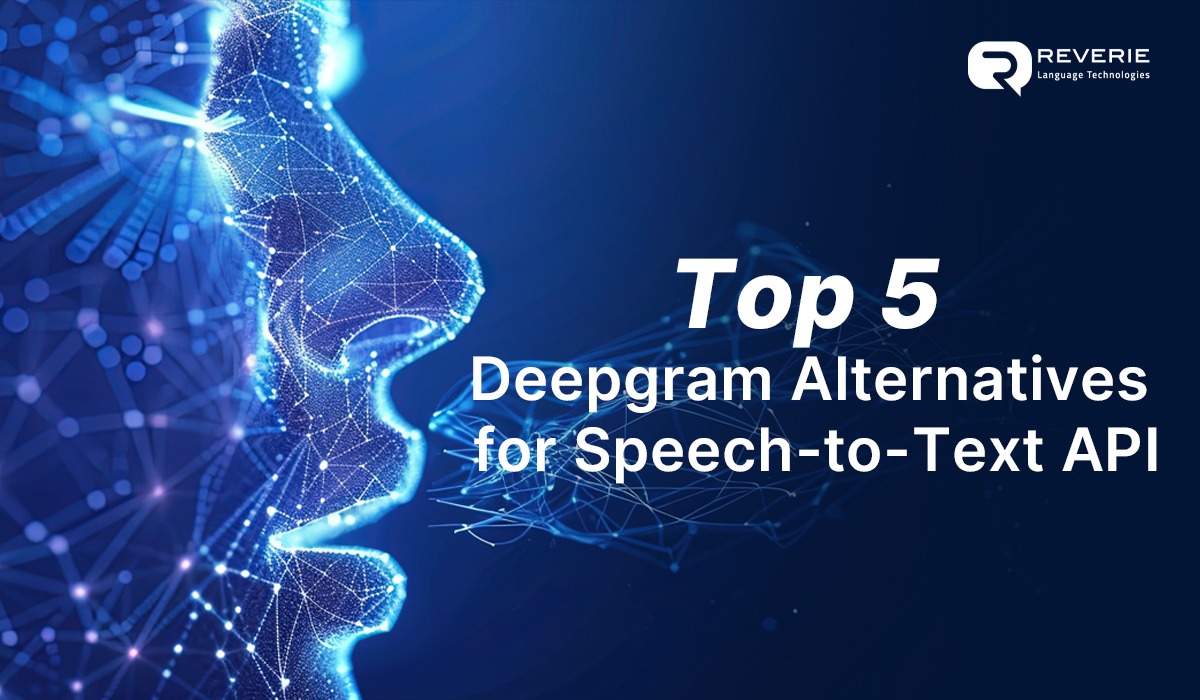In our fast-evolving digital world, the demand for Speech-to-Text APIs has increased significantly. These APIs (Application Programming Interfaces) enable businesses to convert spoken language into written text efficiently.
Speech-to-Text (STT) APIs enhance accessibility while improving customer service and automating transcription processes. Hence, businesses around the world are shopping for an STT solution that suits their business needs.
- To note: Research shows that the Speech-to-Text API market size is expected to reach $12.1 billion by 2031. It is estimated to grow at a CAGR of 17.8% from the period 2022 to 2031.
While there are various prominent players in this arena, Deepgram has made a name for itself with its accuracy and performance. However, businesses now seek more tailored solutions. This is particularly true for diverse markets like India. Hence, looking for a Deepgram alternative that fits your business model is a wise decision.
In this article, we will break down the top 5 speech-to-text APIs through a comprehensive comparison. By understanding their key features, pricing, and other factors, you can make a well-informed decision and find an alternative to Deepgram that suits your business needs, especially in the diverse Indian market.
Why Consider Alternatives to Deepgram in India?
The Indian market presents some unique challenges and opportunities alike for STT APIs, thanks to its diverse linguistic landscape. The country is home to 22 officially recognised languages with hundreds of dialects. This is why businesses need a solution that offers high accuracy in transcribing Indian languages.
Deepgram’s STT API is widely popular for its features and high accuracy. It also provides real-time transcription, while supporting multiple languages. However, despite its strengths, Deepgram may not fit well with your particular business requirements, especially if you are focusing on Indian languages. In addition, Deepgram’s cost can be concerning for smaller businesses or startups.
That is why exploring Deepgram alternatives can open up a box of options that might meet your specific needs. Let’s take a look at the comprehensive comparison of some of the alternatives. By learning about these alternatives, you can find the perfect Deepgram competitor for your business.
Key Highlights:
Key Features and Strengths of Deepgram’s API:
- Real-time processing
- Scalability and customisation
- High accuracy
- Comprehensive analytics
Limitations of Deepgram’s API:
- Limited support for regional Indian languages
- Higher costs for extensive use
- Integration complexities for non-technical users
Top 5 Deepgram Alternatives Speech-to-Text API
Google Cloud Speech-to-Text
Microsoft Azure Speech-to-Text
Speechmatics
Amazon Transcribe
API | Overview | Key Features | Benefits |
Reverie’s Speech-to-Text API | Reverie’s STT API is a strong alternative to Deepgram. It is specifically designed to cater for the diverse linguistic needs of the Indian market. This API excels in recognising and transcribing 11 Indian languages, making it an essential tool for businesses operating in India. Reverie leverages its deep understanding of regional languages to deliver precise and reliable transcriptions. |
| Pros:
|
Google Cloud Speech-to-Text | Google Cloud STT is a versatile API known for its extensive language support. It leverages Google’s machine learning and AI capabilities, which allow this API to transcribe speech in over 120 languages and variants. |
| Pros:
|
Microsoft Azure Speech-to-Text | Microsoft Azure STT is an enterprise-grade solution. The platform is seamlessly integrated into Microsoft’s ecosystem. This API is known for its robustness and scalability along with its high accuracy and reliability. It meets the demands of large enterprises and complex applications. |
| Pros:
|
Speechmatics | Speechmatics is another popular Deepgram competitor that is popular for its accuracy and support for diverse accents. This API excels at recognising and transcribing speech with different regional accents. Hence, it is useful for global applications. |
| Pros:
|
Amazon Transcribe | The last Deepgram alternative on this list is Amazon Transcribe. This STT API integrates seamlessly with the AWS ecosystems. It supports multiple languages while offering reliable transcription services for various use cases, from customer service to content creation. |
| Pros:
|
What You Should Consider Before Choosing a Speech-to-Text API
- Accuracy and Reliability: Precise transcriptions ensure that the information is correctly captured and understood.
- Language Support: Language support according to your requirements and target markets is crucial, as it enables effective communication and accessibility in a multilingual marketplace, like India.
- Ease of Integration: The API should facilitate quick and seamless implementation without extensive technical resources.
- Scalability and Customisation: This allows you to tailor your API to your specific needs and grow with your business.
- Pricing and Value for Money: This way you can ensure that the solution you choose is cost-effective and delivers a good return on investment.
What Makes Reverie’s Speech-to-Text API a Top Choice?
Reverie’s Speech-to-Text API stands out as a robust Deepgram competitor in India. Its support for Indian languages makes it an ideal choice for businesses aiming to expand in the Indian market. This API offers real-time processing, ease of integration, and flexible pricing plans. This way, Reverie ensures cost-effectiveness without compromising on quality.
A notable case study involves a leading iOS e-commerce platform that integrated Reverie’s STT API to enhance customer interactions and bridge the language barrier. The integration resulted in improved user experience and operational efficiency with a customer satisfaction rating of 4.6/5.
Top 5 Deepgram Alternatives: Final Thoughts
Choosing the right Speech-to-Text API has become important for businesses. It allows them to leverage the full potential of voice technology. While Deepgram offers robust features, exploring alternatives like Reverie’s STT API, can offer you better support for Indian languages. You can utilise more tailored solutions for your target market. To explore and learn more about Reverie’s STT API, try for free today.
FAQs
What is a Speech-to-Text API?
A Speech-to-Text API is a tool that converts spoken language into written text. It uses advanced algorithms and machine learning models.
What makes language support crucial for Speech-to-Text APIs?
Businesses require highly accurate transcription of speech in various languages. Language support ensures that the API is able to provide accurate transcriptions, which is crucial for businesses operating in multilingual regions.
Why Reverie’s Speech-to-Text API is a better choice?
Reverie’s STT API is tailored for Indian languages, allowing it to offer real-time processing for regional languages and dialects. It also offers high accuracy and customisation options, making it a perfect choice for businesses in India.
Can STT APIs support multiple languages?
Yes, various STT APIs support multiple languages, enabling accurate transcription for diverse linguistic requirements. Reverie’s Speech-to-Text API offers exceptional support for numerous Indian languages, making it an ideal choice for businesses operating in India.
Can Speech-to-Text APIs be integrated with other tools?
Yes, most Speech-to-Text APIs provide seamless integration with various tools and platforms, allowing for seamless workflow integration. Reverie’s Speech-to-Text API is designed for easy integration while offering robust support for Indian languages.


